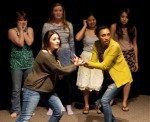Women are stealing the spotlight this weekend in the UCLA production of Tony Award-winning writer Eve Ensler’s “The Vagina Monologues.”
Thirteen women from UCLA make up the cast of this year’s production of the monologues, which are based on over 200 interviews Ensler conducted with women on the intimate subjects of sex, relationships and femininity. The Social Awareness Network for Activism through Art is hosting three performances tonight and Saturday in celebration of the V-Day campaign, a movement started by Ensler to end violence against women.
The monologues address issues that many women share, like the frustrations of menstruation, as well as some that are less common, like rape and sexual assault. Ensler wrote the script when she realized how many women wanted to share their stories but were afraid or insecure because of the stigma surrounding women who are open about their sexual preferences and experiences.
“We want to destigmatize the word ‘vagina,’” said Ekeobong Utibe, a fourth-year communication studies student and co-director of the show. “I want (the audience) to leave understanding that (women) have the same rights as men to talk about (themselves). It doesn’t make a woman sexually promiscuous. It doesn’t make her of lesser value if she voices her sexuality.”
This year, the monologues are put in the context of a girls’ sleepover, a new approach taken by Utibe and co-director Suzanna Tran, a second-year communication studies student. Tran and Utibe said they added this new element in order to engage the audience in a conversation rather than a set script. They said they want the audience to come away from the performance feeling comfortable enough to have their own conversations about their sexual health and experiences.
“I want especially those who identify as female to feel more comfortable with their bodies and know that they’re not alone if they’re insecure or if they’ve been hurt, physically or mentally,” Tran said.
Kaitlin Huwe, a fourth-year theater student and cast member, said the show’s power comes from the inherent intimacy of discussing vaginas and relationships in conjunction with the fact that almost every girl can relate to the stories.
There are stories about women seeing their vaginas for the first time, victims recovering from sexual assault and a grandmother witnessing the birth of a granddaughter. These stories are often only shared between best friends, but the play opens them to the audience. Huwe said the relationships between cast members embodied this openness and intimacy from the very first rehearsal.
“We showed up and we immediately started talking about our sex lives, about growing up and not knowing our dads,” Huwe said. “We just jumped right into it because we knew we were there to be open, to uncover, to grow, to share.”
Huwe and Utibe said they hope the performances inspire women to ask their own questions, share their own stories and ultimately embrace their sexuality as a step toward discovering their own power as women.
In conjunction with the show, the Social Awareness Network for Activism through Art will host a Q-and-A session with the cast following the performances as well as a photo collage of women. The photos are taken by members of the organization to redefine society’s ideas of beauty and femininity.
“It’s different women, different faces, different titles with each face or just associated with women,” Utibe said. “There’s not just one type of woman. There’s not just one type of beauty. That’s what the collage is supposed to represent.”
This diversity is reflected in the cast, which includes students from different ethnic backgrounds and academic pursuits who have all come together to tell these stories that often go unheard because of stigmatization of women who are open about their sexuality. Huwe said the solidarity of the cast members in their common goal of female empowerment is the most exciting aspect of the show.
“I’m seeing women who are pre-med (students), I’m seeing women who are nursing students and I’m seeing women who are poetry (students) tell a story that is not their own,” Huwe said. “That’s my favorite thing: watching all these other girls get up there and tell stories that aren’t their own that need to be heard.”
